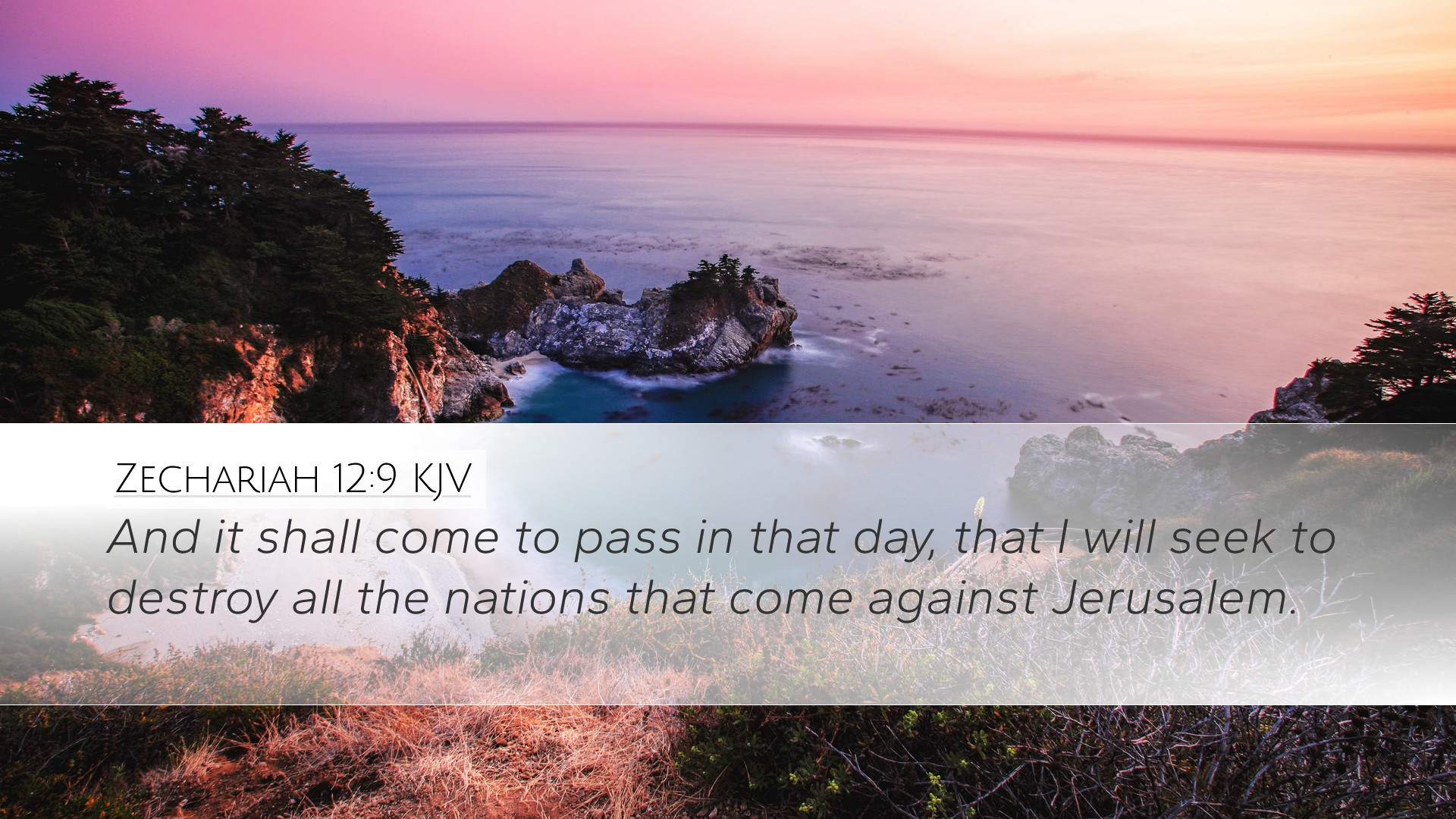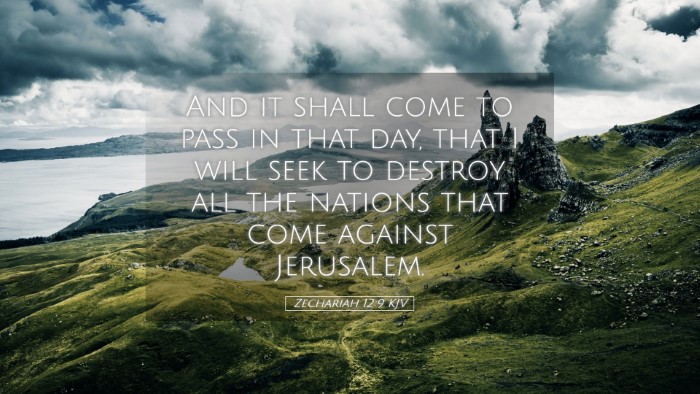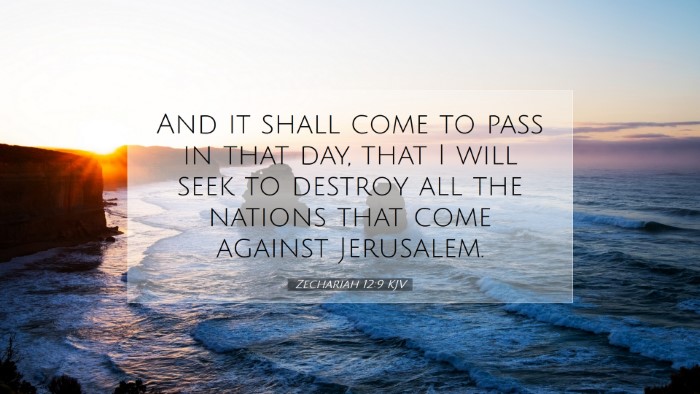Old Testament
Genesis Exodus Leviticus Numbers Deuteronomy Joshua Judges Ruth 1 Samuel 2 Samuel 1 Kings 2 Kings 1 Chronicles 2 Chronicles Ezra Nehemiah Esther Job Psalms Proverbs Ecclesiastes Song of Solomon Isaiah Jeremiah Lamentations Ezekiel Daniel Hosea Joel Amos Obadiah Jonah Micah Nahum Habakkuk Zephaniah Haggai Zechariah MalachiZechariah 12:9
Zechariah 12:9 KJV
And it shall come to pass in that day, that I will seek to destroy all the nations that come against Jerusalem.
Zechariah 12:9 Bible Commentary
Commentary on Zechariah 12:9
Bible Verse: "And it shall come to pass in that day, that I will seek to destroy all the nations that come against Jerusalem."
Introduction
The prophetic words of Zechariah, particularly in chapter 12, reflect a period of great turmoil for the nation of Israel. This verse serves as a pivotal declaration of God's sovereignty and a promise of divine intervention on behalf of His people. By synthesizing insights from various public domain commentaries, we delve into the multifaceted meanings and implications of this passage.
Contextual Background
This verse is situated within a larger prophetic narrative detailing the future restoration of Jerusalem and the final triumph of God's covenant people. Zechariah was a prophet during the post-exilic period, a time marked by the rebuilding of the temple and the re-establishment of Jewish identity. His prophecies often oscillate between immediate historical contexts and distant eschatological themes.
Analyzing the Key Components
“And it shall come to pass in that day”
This phrase indicates a future event characterized by significant transformation. Matthew Henry notes that "that day" is often a reference to the era of the Messiah, heralding both judgment and redemption. This sense of immediacy suggests that God's intervention is not only hopeful but inevitable.
“I will seek to destroy all the nations”
The assertion of God's active pursuit to destroy nations that oppose Jerusalem emphasizes His role as a divine warrior. Albert Barnes elaborates that this destruction is not random; it is a judicial act of God against nations that have historically persecuted His people. The term "seek" conveys both intention and severity, indicating that God will actively oppose those who rise against His chosen city.
“That come against Jerusalem”
Jerusalem serves as the focal point of God's promises and presence. Adam Clarke emphasizes the symbolic significance of the city, representing God's covenant relationship with Israel. The attack against Jerusalem can be understood both literally and metaphorically, as a broader assault on the faithful and on God's redemptive plans. This theme of conflict recurs throughout the Old Testament, reminding readers of the ongoing struggle between divine purpose and human opposition.
Theological Implications
Divine Sovereignty
This passage profoundly speaks to the sovereignty of God over the nations of the earth. The actions described indicate that God is not a passive observer but an active participant in human history, guiding it toward His ultimate purpose. Both Henry and Barnes highlight that God's protection over Jerusalem serves as a microcosm of His wider governance over the world.
Hope for Restoration
In the face of opposition, God’s promise to defend Jerusalem provides hope. The assurance that God will act to shield His city speaks directly to the fears and uncertainties faced by the Israelites during Zechariah’s time and extends hope to Christians today, who find assurance in God’s eventual triumph over evil.
Future Eschatological Events
The declaration in Zechariah 12:9 also looks toward eschatological fulfillment where God's intervention will be visibly manifested. Commentaries suggest that this passage points to the end times and the ultimate victory of God over all forces of evil arrayed against His people. Believers are reminded that despite present challenges, God's ultimate victory is assured.
Practical Applications
Encouragement for Believers
This verse serves as a powerful reminder for pastors and believers alike to maintain faith amid adversity. When facing spiritual battles, one can draw strength from God’s promise to protect and defend His people, echoing the assurance expressed in this prophetic declaration.
Call to Prayer and Vigilance
Church leaders and congregations should take this prophecy as a call to prayer for protection over Jerusalem and the Church globally, understanding the spiritual significance of these places. As noted by Clarke, prayer is instrumental in invoking God’s protection and seeking His presence in times of trouble.
Understanding God's Judgment
Additionally, the passage serves as a cautionary reminder of the consequences faced by those who oppose God’s people. Pastors are encouraged to teach their congregations about the gravity of sin and the importance of repenting and seeking God’s ways to avoid the fate that awaits adversaries of His kingdom.
Concluding Thoughts
Zechariah 12:9 encapsulates a profound theological truth that resonates across ages: God’s unwavering commitment to His people and His divine authority over the nations. As we reflect on this passage, may we find both solace in God’s protection and motivation to uphold righteousness, knowing that He ultimately is the defender of Jerusalem and the faithful.


